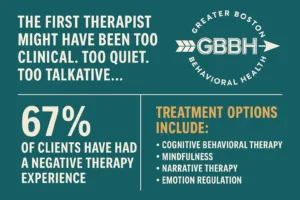You reached out. Maybe for the first time. Maybe after trying everything else.
You did the intake. Met the therapist. Showed up. Talked. Tried the worksheets. Sat in silence. Maybe cried a little. Or maybe you didn’t get that far.
But when it was all over, you walked away thinking, That didn’t help.
Maybe you felt the same—or worse. Maybe you left confused, discouraged, or just numb. And maybe, at some point, you told yourself, I guess therapy just isn’t for me.
That moment? It sticks. And for a lot of people, it keeps them from trying again.
But what if the problem wasn’t you?
What if it wasn’t even therapy, really?
What if the approach, the therapist, the timing, or the method just… didn’t fit?
At Greater Boston Behavioral Health, we hear stories like yours every day. People who wanted help. Asked for help. Got the wrong kind. And almost didn’t come back.
This blog is for you. Because we believe anxiety treatment isn’t one-size-fits-all. And we’ve seen what happens when someone finally finds the approach that actually clicks.
Not Every Therapist Is the Right Fit—And That’s Okay
Let’s say it clearly: just because someone has the credentials doesn’t mean they’re your person. That first therapist might have been too clinical. Too quiet. Too talkative. Too focused on a model that didn’t meet your needs.
It’s not a failure. It’s a mismatch.
Therapy is personal. It requires trust, comfort, and the feeling that you don’t have to perform or protect yourself during the hour that’s supposed to be for you.
The first time might not land. The second might not either. But that doesn’t mean the right fit isn’t out there.
Part of what we offer at Greater Boston Behavioral Health is options. Different clinicians. Different personalities. Different approaches. You don’t have to start over to try something new.
What Didn’t Work Before Might Still Work—Differently
Here’s another thing we’ve seen: sometimes people come back years after their first attempt. They’re skeptical. Cautious. Kind of bracing for disappointment. And then… they’re surprised.
Because with the right therapist, timing, and support, something shifts.
A strategy that once felt pointless finally lands.
An exercise that once felt cheesy actually helps.
A conversation that once made you shut down opens something up instead.
Why? Because context matters. You’re not the same person you were then. The way you receive care might have changed. And the person offering it this time might be the one who gets it right.
Let’s Talk Honestly About Why People Leave Therapy
There’s usually more to the story than “it didn’t work.”
Here’s what we often hear when people return after stepping away:
- “I didn’t feel heard.”
- “It felt like they were reading from a script.”
- “I wanted tools, not just to vent.”
- “I wanted to vent, not just be handed a worksheet.”
- “It felt like they were waiting for me to be okay faster than I was.”
Every one of those reasons is valid. And every one of them points to a need for something different—not a reason to give up on treatment altogether.
Anxiety treatment should feel like a partnership. Not a performance.
The Many Shapes of Anxiety Treatment
Anxiety doesn’t look the same in everyone. So why should treatment?
At Greater Boston Behavioral Health, we offer care that’s customized to you—not a textbook version of anxiety. Here are just a few options we might explore together:
- Cognitive Behavioral Therapy (CBT): Great for people who overthink, spiral, or feel stuck in “what if” loops
- Mindfulness-based approaches: Useful for those who feel physically anxious or emotionally disconnected
- Narrative therapy: Ideal for people carrying shame, unresolved stories, or past invalidation
- Psychoeducation: For people who want to understand anxiety before they try to manage it
- Emotion regulation skills: Helpful for those who struggle with irritability, overwhelm, or emotional reactivity
- Relational therapy: Best for people who need to trust the therapist deeply before opening up
You don’t have to know which one is right. That’s our job—to figure it out together, based on who you are and how anxiety shows up in your life.
“I Thought Therapy Meant Sitting on a Couch Talking About My Childhood”
That’s a common (and understandable) belief. And for some, talking about the past is helpful. But if that’s not where you’re ready to go—or if that’s not what you need—then we won’t force it.
Some people need grounding first. Some need action. Some need a soft place to land without needing to explain themselves yet.
Anxiety treatment can be:
- Action-oriented
- Educational
- Emotional
- Gentle
- Fast-paced
- Slow and steady
The right pace isn’t one-size-fits-all. It’s whatever keeps you in the room without shutting down.
When Treatment Finally Clicks, Things Feel… Different
Not perfect. Not magical. Not instantly “fixed.” But different.
Clients who stick around long enough to find that click often say:
- “I started noticing when I was anxious instead of getting swept away by it.”
- “I didn’t dread going to therapy. I actually started looking forward to it.”
- “I finally felt like someone saw me, not just my anxiety.”
- “I could tell my therapist liked working with me. That mattered more than I expected.”
- “It didn’t feel like homework. It felt like help.”
Looking for Anxiety Treatment in Waltham, MA? These kinds of shifts don’t require a complete life overhaul. Just a small crack in the pattern—and someone to walk through it with you.
You Deserve to Try Again—Without Shame
Maybe you ghosted your last therapist. Maybe you canceled and never rescheduled. Maybe you said you’d come back and didn’t.
That doesn’t disqualify you from trying again. You’re still allowed.
You’re still worth the effort.
At Greater Boston Behavioral Health, we don’t ask, “Why didn’t it work last time?”
We ask, “What would help it feel different this time?”
FAQs About Trying Therapy Again After a Bad Experience
Do I have to go back to weekly therapy right away?
No. We’ll build a schedule that fits you. Some people start with biweekly sessions or shorter-term care. We adapt to your life—not the other way around.
What if I don’t want to talk about my past?
That’s okay. You can focus on present symptoms, current stress, or specific goals. We only go deeper when you decide it’s helpful.
How do I ask for a new therapist if I don’t click?
Just let us know. No offense will be taken. We want you to feel comfortable. We have multiple clinicians, and switching doesn’t mean you’ve failed—it means you’re advocating for yourself.
Can I get help even if I don’t have a formal diagnosis?
Absolutely. If anxiety is interfering with your daily life—even if no one’s put a label on it—you deserve support.
Will I have to start from scratch if I’ve done therapy before?
No. You can bring what worked (or didn’t work) into your new sessions. It’s not about repeating the past—it’s about building from where you are now.
This Time, It Could Be Different
Call (888) 450-3097 or visit our Anxiety Treatment services in Boston, Massachusetts to learn more. You don’t need to believe 100% that it will work—just enough to try again.
We’ll meet you in that space. No judgment. No pressure. Just help that fits.


